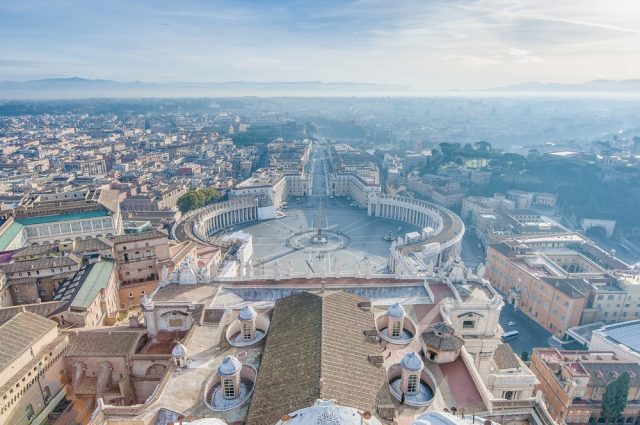
On the occasion of the Conference for the Reconstruction of Ukraine, held on July 10th and 11th in Rome at the “Nuvola” in the EUR district, Ukrainian President Volodymyr Zelensky undertook a series of high-level diplomatic meetings, culminating in a visit to Pope Leo XIV at his summer residence in Castel Gandolfo on July 9th. This moment, with its strong symbolic and diplomatic value, marked a new chapter in the Vatican’s commitment to promoting peace and supporting the Ukrainian people, in a geopolitical context still marked by hostility and violence. The International Conference for the Reconstruction of Ukraine represented a political and economic juncture of global importance, aimed at coordinating international efforts in rebuilding Ukraine’s infrastructure, along with its social and economic fabric, devastated by over three years of war. President Volodymyr Zelensky’s visit to Rome provided the opportunity for a series of bilateral and multilateral meetings with key European and transatlantic stakeholders. Among these, the meeting with Pope Leo XIV emerged as one of the most significant events, not only due to the high profile of the participants, but also due to the symbolic role of the Holy See as a potential mediator in the conflict.
THE POLITICAL AND MILITARY CONTEXT OF THE VISIT
Zelensky’s visit came at a time of escalation in the conflict, with a Russian attack that affected the entire Kiev area. The Ukrainian president himself described the episode as the largest airstrike since the beginning of the war, highlighting the dramatic situation on the ground and the urgency of sustainable political solutions. In this context, Rome assumed a central role as a diplomatic platform, hosting not only the economic conference but also crucial political discussions.
THE SIGNIFICANCE OF THE VISIT TO POPE LEO XIV
The meeting between Zelensky and Leo XIV took place in Castel Gandolfo – the Pope’s summer residence just outside Rome – in an atmosphere of dialogue and sharing. The Pope reaffirmed his closeness to the Ukrainian people, declaring his willingness to host delegations from the conflicting parties in the Vatican, thus opening the door to a new channel of international mediation. The Holy Father defined dialogue as the preferred path to ending hostilities, placing particular emphasis on the release of prisoners and the return of children deported to Russia. For his part, Zelensky expressed gratitude for the Pope’s willingness, while maintaining a cautious stance. He emphasized that, while diplomatic openness is welcome, the Kremlin’s aggressiveness continues to hinder any real negotiations. Ukraine’s request for tougher energy sanctions against Russia and its support in terms of armaments remain essential tools for Kiev to rebalance the negotiating table.
THE VATICAN AS A SPACE FOR MEDIATION
The Vatican’s role in international relations has always been marked by an approach of active neutrality. The Holy See, while lacking coercive instruments, possesses unparalleled symbolic and moral capital. Pope Leo XIV followed the legacy of his predecessors in attempting to forge paths to peace, as confirmed by the previous dispatch of Cardinal Matteo Zuppi as papal emissary to the capitals involved in the conflict. Despite the apparent diplomatic stalemate, Leo XIV renewed his call for dialogue, reaffirming the Vatican’s willingness to host direct talks. The United States has officially recognized this possibility, although Russia has not yet expressed formal consent. In this sense, Zelensky’s visit takes on the characteristics of a strategic opening, aimed at strengthening international dialogue with the mediation of a third party perceived as impartial.
HUMANITARIAN IMPLICATIONS
One of the most touching aspects of the meeting was the explicit reference to the Ukrainian children deported to Russia. Zelensky asked the Pope to intensify efforts for their repatriation, emphasizing the need to ensure their assistance and care, hopefully in Italy. The Vatican, while not publicly disclosing operational details, confirmed its ongoing commitment to the release and return of the minors. This issue has taken on a prominent symbolic and humanitarian significance, becoming a point of convergence between Vatican diplomacy and the priorities of the Ukrainian government. The international condemnation of forced deportations, also expressed in numerous United Nations resolutions, is echoed in the pastoral concern of the Pontiff, who called the war “senseless” and expressed empathy for the affected families.
A GESTURE FULL OF HOPE AND CAUTION
Zelensky’s visit to Pope Leo XIV was not merely a ceremonial event, but a moment of profound symbolic and diplomatic significance. In a context marked by violence and the fragmentation of the negotiating front, the meeting represented a joint appeal for responsibility and international solidarity. While the war continues to claim victims and deepen divisions, the Vatican’s openness to a possible mediation role keeps alive the hope of a negotiated path that could one day end the conflict. The Ukrainian leader, albeit with realism and skepticism, respectfully welcomed the Holy See’s proposal, aware that every glimmer of dialogue, however fragile, can represent a step toward peace. In this sense, the Roman setting and the Pope’s embrace take on the value of a powerful signal, addressed both to international chancelleries and to the populations exhausted by the war.



 Subscribe
Subscribe